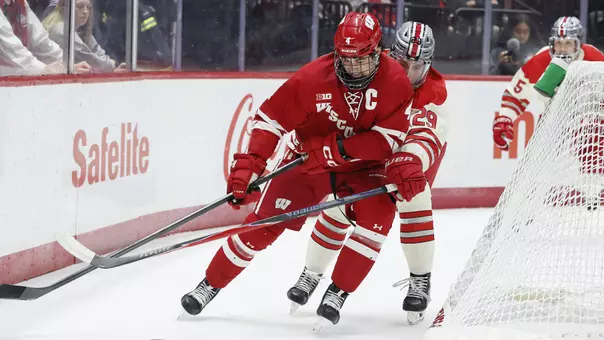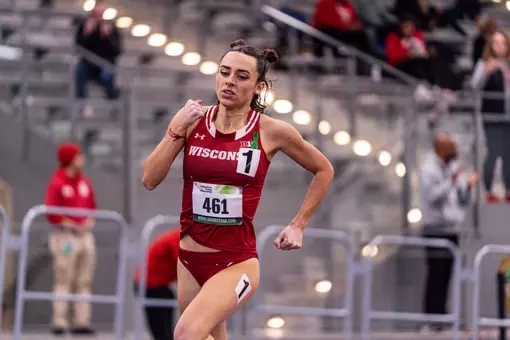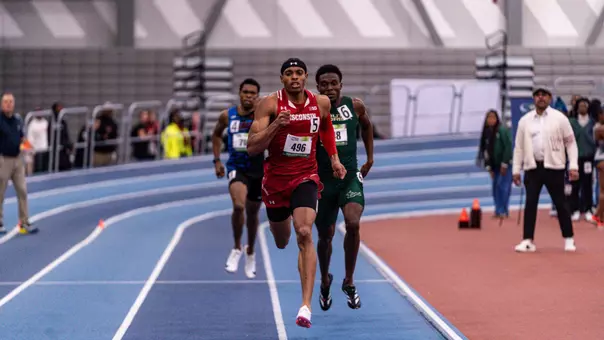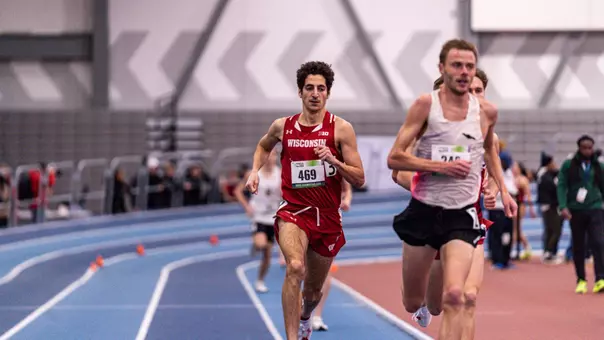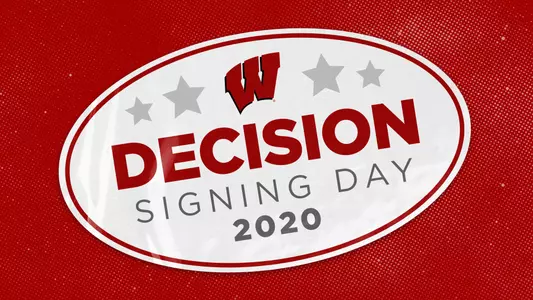
Baggot: How are Badgers recruiting now?
November 13, 2020 | General News, Men's Cross Country, Men's Hockey, Men's Soccer, Men's Track & Field, Women's Cross Country, Women's Track & Field, Volleyball, Andy Baggot
New technology and adapting new methods keeps art of recruiting fresh for UW programs
 |
|
|
BY ANDY BAGGOT
MADISON, Wis. — Brittany Dildine was out for an afternoon walk, reveling in the glory of an unseasonably warm late-autumn Friday, when she tried to bring perspective to how a global pandemic has changed her corner of the world.
Dildine is the recruiting coordinator for the Wisconsin volleyball team, a marquee role in an elite operation. She oversees the process of identifying top prospects and convincing them to come to Madison and play for the Badgers.
The fact Wisconsin has reached the Sweet 16 of the NCAA tournament in all seven of her seasons, advancing to the national championship match in 2013 and '19, is proof that Dildine knows what she's doing on behalf of Coach Kelly Sheffield and his staff.

But like everyone in the college coaching business, Dildine has had to embrace a new way of doing her job. That reality came to life last March when the coronavirus became a deadly, disruptive force, bringing the sports world to an abrupt, uncomfortable halt.
Schools saw their seasons cancelled, leaving conference and national titles vacated.
Programs saw their funding discontinued, leaving a bad taste in many mouths.
Student-athletes saw their careers either put on hold indefinitely or end all together, leaving many disconsolate.
In the midst of all that, the NCAA put major restrictions on recruiting, especially those related to travel and evaluations. Most prominent is a dead period that's currently set to run through Jan. 1, 2021. Division I coaches in all sports are prohibited from recruiting prospects in-person, both on and off campus. Coaches cannot have face-to-face contact with college-bound student-athlete or their parents, nor can coaches watch a prospective student-athlete compete or visit their high school. Coaches may write and phone prospects and their parents.
NCAA officials maintain that this approach is a safety issue enacted in response to COVID-19 and is being done with the guidance of medical experts. While the limitations are understandable, they represent a major undertaking for Dildine and her college coaching peers.
That test is spotlighted for the next week as the NCAA early signing period plays out. From Nov. 11-18, prospects from all sports except football can sign National Letters of Intent. The early signing window for football is Dec. 16-18.
Wisconsin teams across all sports, except football, will sign recruits during this week's early period and many have already been announced on the Badgers' social media channels.
The UW volleyball program has pledges from three prospects for 2021 and has tentatively filled the three openings it has for 2022, but the recruiting carousel never really stops. Dildine said pandemic-related restrictions are being felt in a lot of ways, but one stands out.
"The largest challenge in itself is we can't go out and do in-person evaluations," she said. "That alone really sets a level of difficulty that's hard to (measure), because there's a lot of value when you're watching a prospect in a match and you're seeing them interact and you can hear what's being said to that prospect by the coach and how they respond to that feedback.
"It's the live evaluation that our staff has been reliant on over the past couple of years. We do that because there's a really specific niche-type player that's attracted to our program, so we've spent a lot of time studying how those athletes carry themselves."
That niche is best identified through personal interaction, whether it's talking face-to-face with the prospect, her parents, her club or high school coach and her teachers. There's also the social interplay between the recruit and current members of the team, who tend to have major voices in the selection process.
All those avenues now have barricades thanks to the coronavirus.
Yet the three Wisconsin recruits for 2021 made their non-binding commitments barely seeing the University of Wisconsin, two visited once and one never stepped foot on campus. A similar situation has occurred for the current threesome in 2022, only one has had a campus visit. As things stand now, Dildine said she can't initiate contact with 2023 prospects until June 21.

So how have the Badgers managed to keep the flow of recruits moving through the pipeline?
Dildine said Sheffield and her fellow assistant coach Gary White have been watching raw video of live matches and making a lot of calls to coaches, especially at the high school level. Text messages, graphics and videos produced in-house have tremendous value as well.
Dildine has also embraced the value of Zoom calls, which serve as the most personal interaction coaches can have with prospects during the pandemic. She said that when the recruiting calendar returns to normal, she'll use the Zoom hook-ups to streamline the messaging for on-campus visits.
"There's a lot of positive, transformative practices that I think I'm going to take away with me and continue to use even after the pandemic is over," she said.
Mick Byrne, the director of men's and women's track and cross country, might have the weightiest recruiting project among his Wisconsin peers. He and his five full-time assistants are trying to manage six rosters — cross country, indoor track and outdoor track — despite limited in-roads to talent evaluations.
"I love going into a kid's home," Byrne said. "I think you get a great perspective on the kid and the parents. Obviously that's been taken away from us."

Byrne and his assistants, Mackenzie Wartenberger (women's cross country), Dave Astrauskas (throws), Nate Davis (pole vault, high jump, multi-events), Kareem Jackson (sprints, hurdles, horizontal jumps) and Gavin Kennedy (middle distance), recruit to their specialties and the group ultimately weighs in on their priorities.
Problem is, they're assessing recruits who may be 18 months removed from their last performance because the pandemic has affected prep competitions as well as those in college.
"What's different for us this year is we're recruiting on sophomore times and it doesn't matter if you're a boy or a girl, everything changes from the end of your sophomore year," Byrne said.
"We're relying a lot more on coaches, friends, people we know out there in the high school business."
Byrne lamented the plight of prospects who aren't seen as blue-chip talents right now, but they have the potential to blossom in an elite developmental program like Wisconsin.
Byrne, in his seventh season overseeing the men's and women's programs, said the absence of campus visits is another source of angst because it deprives prospects of a chance to interact with current Badgers.
"It's very difficult for them and it's difficult for us because it kind of changes the ballgame," he said.
"It's definitely been tougher overall, no doubt about it. But it's a challenge and you have to meet that challenge. You only get out of it what you put into it."
While Byrne works the phones, one thought keeps resurfacing.
"I want the dead period to end," he said. "It seems like it's gone on forever."
John Trask, the men's soccer coach since 2010, is fresh off signing a big, 10-person class in the spring. He has two seniors. He admits his recruiting load is light compared to some of his colleagues.
"It's different for me than a lot of coaches," he said. "But I think the anxiety is starting to ramp up."
How so?
"We're looking at film of a kid from six months ago," Trask said. "We haven't seen these kids play in seven months."

Trask said he's currently looking at a pool of six to eight prospects for his next class, so he's got alerts out to contacts around the world.
"They know the specs," Trask said, alluding to Wisconsin's academic and recruiting profile.
"It's really these rising juniors now for us. We're having to do a lot of recruiting through word-of-mouth now. We have to trust our club contacts."
Tony Granato is entering his fifth season as men's hockey coach with a whole new perspective on recruiting.
"It's been different from the standpoint that we're used to being on planes and driving and being able to watch lots and lots of games," he said. "Now we're doing them online."
That's beneficial in one sense. Granato and his assistants, Mark Osiecki and Mark Strobel, can streamline their viewing to just the shifts they want to see from a particular prospect, turning a two-hour process into 20 minutes or so.
But there's a less-than-ideal trade-off. Granato would much rather travel and evaluate in person.
"Part of the recruiting process is, yeah, you getting to know the kid," he said. "But I think it's more important for the kid to get to know you and feel comfortable."
Same goes for the prospect's family.
"It's hard to be on a Zoom call trying to make the family feel comfortable," Granato said. "It's more challenging than it would be if you had a lunch or you're at the game with the family. They're part of the ride, too."

Granato said there's a reason why three down-the-road recruits committed this summer without having visited the UW campus. The Badgers have an elite reputation all over the world and a consistent message that's shared through social media.
"We're not missing anything, from our tradition and our history, our alumni network, our facilities, our coaching staff, our strength and conditioning coach, our academics, our places to live and go to school, our atmosphere and environment," said Granato, who plans to sign eight recruits during the early period. "There's some other great schools. There's some other great programs. But I don't think anybody can say they're better and have more to offer than we do."
Even in a pandemic.

